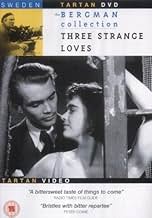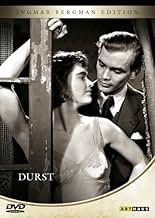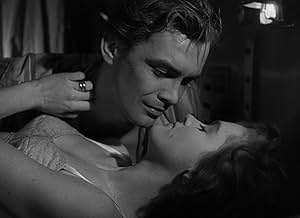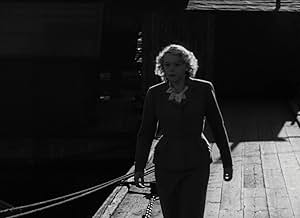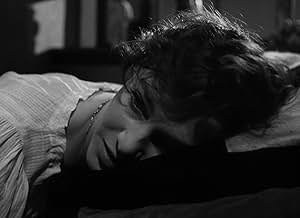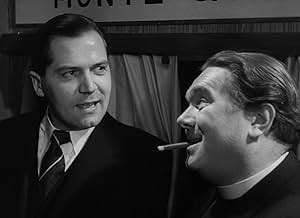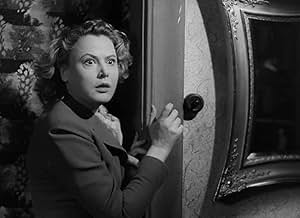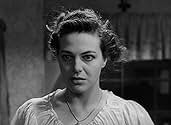VALUTAZIONE IMDb
6,5/10
3019
LA TUA VALUTAZIONE
Una coppia bisognosa in un cattivo matrimonio torna a Stoccolma dopo un viaggio in Italia. Nel frattempo, una vedova resiste alle seduzioni di due persone diverse: il suo psichiatra e un'ami... Leggi tuttoUna coppia bisognosa in un cattivo matrimonio torna a Stoccolma dopo un viaggio in Italia. Nel frattempo, una vedova resiste alle seduzioni di due persone diverse: il suo psichiatra e un'amica lesbica.Una coppia bisognosa in un cattivo matrimonio torna a Stoccolma dopo un viaggio in Italia. Nel frattempo, una vedova resiste alle seduzioni di due persone diverse: il suo psichiatra e un'amica lesbica.
- Regia
- Sceneggiatura
- Star
Mimi Nelson
- Valborg - Ruts kamrat i balettskolan
- (as Mimmi Nelson)
Carl Andersson
- En man i kupén med festande tågpassagerare (1)
- (non citato nei titoli originali)
Wiktor Andersson
- Doorkeeper
- (non citato nei titoli originali)
Verner Arpe
- Tysk biljettsamlare
- (non citato nei titoli originali)
Ingmar Bergman
- Tågpassagerare
- (non citato nei titoli originali)
Britta Brunius
- Sjuksköterskan efter Ruts abort
- (non citato nei titoli originali)
Calle Flygare
- Den danske prästen på tåget
- (non citato nei titoli originali)
Sven-Eric Gamble
- Glasmästeriarbetaren på Rosengrens mottagning
- (non citato nei titoli originali)
Inga Gill
- Lady at Hotel
- (non citato nei titoli originali)
Herman Greid
- Stadsbudet i Basel
- (non citato nei titoli originali)
Helge Hagerman
- Den svenske prästen på tåget
- (non citato nei titoli originali)
Recensioni in evidenza
I thought I had seen every Bergman film ever made, so I was thrilled to stumble onto this one the week after he died. I had no trouble following the intertwining stories because I kept track of the characters' names and their relationships. So what confused many viewers seemed totally justified, especially compared to films in our post-Altmam era where more and more we see "stories" where seemingly unconnected people's lives crisscross and are junxtaposed ("Magnolia," and "Babel" to name a few).
The filming is fantastic for the time and prefigures the use of close ups in "Through a Glass Darkly." Very different from "Port of Call" just before and "To Joy" just afterwards. I found the film less bleak than "Prison," its lyrical moments prefiguring "Summer Interlude," one of my favorite early Bergmans.
The lesbianism was blatant enough for me, much more obvious than in "Young Man With A Horn," made around the same time in the US. Curiously, this section of the film helped illuminate Bergman's use of the theme in "The Silence," and this makes me want to view that film again. The fact that this is a film Bergman didn't write is intriguing, because he harmonizes his visual language to the rhythms of the screenwriter's oral one. The dialog was rather light for the seriousness of the situations. Perhaps Bergman himself would have been heavier-handed.
Lastly, there are the actresses, and here Bergman's direction of actors seems to solidify, as I find his previous films much more uneven on this score. Here the women, especially the young dancer, show real depth.
Keep in mind that this is not his first film, but still an early work, a seed that will grow into later masterpieces. Then you won't be disappointed, even after the mediocre last minutes of a work that definitely showed promise.
The filming is fantastic for the time and prefigures the use of close ups in "Through a Glass Darkly." Very different from "Port of Call" just before and "To Joy" just afterwards. I found the film less bleak than "Prison," its lyrical moments prefiguring "Summer Interlude," one of my favorite early Bergmans.
The lesbianism was blatant enough for me, much more obvious than in "Young Man With A Horn," made around the same time in the US. Curiously, this section of the film helped illuminate Bergman's use of the theme in "The Silence," and this makes me want to view that film again. The fact that this is a film Bergman didn't write is intriguing, because he harmonizes his visual language to the rhythms of the screenwriter's oral one. The dialog was rather light for the seriousness of the situations. Perhaps Bergman himself would have been heavier-handed.
Lastly, there are the actresses, and here Bergman's direction of actors seems to solidify, as I find his previous films much more uneven on this score. Here the women, especially the young dancer, show real depth.
Keep in mind that this is not his first film, but still an early work, a seed that will grow into later masterpieces. Then you won't be disappointed, even after the mediocre last minutes of a work that definitely showed promise.
Bergman is beginning to develop some of his personal traits to be found in the later, more mature film. He hasn't yet learned to unveil the characters quite yet but the interactions are quite interesting. There are several stories going on here and a couple of groups of characters and sometimes the switching back and forth can be confusing. I would certainly agree with one reviewer that "thirst" was used not only metaphorically throughout but quite literally from the first image of an eddy of water during the credits to the very end. The characters are always drinking something or other - water (it's midsummer after all), wine(one of the characters is an alcoholic), even milk. The characters are actually quite self-centered, as in so many of Bergman's earliest films, and not particularly likable. The scene with the "therapist" was especially disturbing and the characters seem more prone to bounce off each other than anything. It's when they start to communicate that the trouble really begins to brew as we've learned from the later films.
Curtis Stotlar
Curtis Stotlar
Raul's a dislikeable chap, gets the feeling that he's being trapped, in the blink of an eye, it's adios, goodbye, marches off vowing not to come back.
Ruth is quite high maintenance, takes everything that you can dispense, she'd turn you to a husk, grinding you down to dust, at her mercy without strong defence.
Bertil's nightmare hasn't come true, the bottle he threw he withdrew, a small recompense, brings him back to sense, but next time he might not wake to two.
Valborg plays life solitaire, her secret her shame not to share, though with Eva she tries, it all ends in surprise, back to solitude with no one to care.
Eva is lost all alone, a vulnerable hand she's been sown, now she's starting to fade, as she tries to evade, cascades to the depths as if blown.
Several intertwined strands reflect the frailties, the ignorance and the disappointments we've all encountered at some time or another - although hopefully with a little less melodrama.
Ruth is quite high maintenance, takes everything that you can dispense, she'd turn you to a husk, grinding you down to dust, at her mercy without strong defence.
Bertil's nightmare hasn't come true, the bottle he threw he withdrew, a small recompense, brings him back to sense, but next time he might not wake to two.
Valborg plays life solitaire, her secret her shame not to share, though with Eva she tries, it all ends in surprise, back to solitude with no one to care.
Eva is lost all alone, a vulnerable hand she's been sown, now she's starting to fade, as she tries to evade, cascades to the depths as if blown.
Several intertwined strands reflect the frailties, the ignorance and the disappointments we've all encountered at some time or another - although hopefully with a little less melodrama.
Ingmar Bergman very quickly became one of my favourite directors. Have only been familiar with him since 2012 which was around the period when my film and television taste started to broaden, but it was easy to be intrigued by his distinctive directing style so it was easy to get into his work. Not all his films are great and he was not immune from misfires, but many of them are very, very good and even masterpieces, it is not hard to see why he became such a big influence in cinema.
None of Bergman's late-40s films, when he was still learning his craft and finding his style, are among his best work. It was around the early-mid-50s when he began to come into his own. His early films are still interesting though and there are not really any duds. The most commercially successful of Bergman's early films, 'Three Strange Loves' as called in my country is certainly very intriguing and it is well done in a lot of areas. The story is very flawed and something of a big caveat but 'Three Strange Loves' is fine from a directing standpoint and has a lot to recommend.
'Three Strange Loves' story could have been executed better. The structure is very jumpy, with some constant backing and forthing that was sometimes hard to follow. The flashbacks intrigue mostly but occasionally drag and some could have been placed better and not as randomly introduced or as fragmented.
Do agree as well that the supporting characters' subplots are not as involving as that of the central couple. Some are also not as necessary or as cohesive as others and feel like padding.
On the other hand, 'Three Strange Loves' is well made visually, with the photography being both stylish and atmospheric. Bergman's directing was becoming more refined all the time and there are enough glimmers of brilliance, one can see his distinctive style coming through in some of the more symbolic imagery. The music complements the tone very well and fits appropriately. The script is thought-provoking and sometimes poetic.
Although the story's execution could have been much better, it fascinates thematically with heavy themes not trivialised and actually pretty daringly uncompromising. The tone, revolving around an ahead-of-its-time and not as frequently portrayed back then subject, is bleak and purposefully not a pleasant watch, but the central couple plot is often harrowing and has genuine moments of poignancy. Complete with a strongly written female lead character and the two lead performances are quite powerful.
In a nutshell, well done early on but Bergman went on to much better things. 7/10
None of Bergman's late-40s films, when he was still learning his craft and finding his style, are among his best work. It was around the early-mid-50s when he began to come into his own. His early films are still interesting though and there are not really any duds. The most commercially successful of Bergman's early films, 'Three Strange Loves' as called in my country is certainly very intriguing and it is well done in a lot of areas. The story is very flawed and something of a big caveat but 'Three Strange Loves' is fine from a directing standpoint and has a lot to recommend.
'Three Strange Loves' story could have been executed better. The structure is very jumpy, with some constant backing and forthing that was sometimes hard to follow. The flashbacks intrigue mostly but occasionally drag and some could have been placed better and not as randomly introduced or as fragmented.
Do agree as well that the supporting characters' subplots are not as involving as that of the central couple. Some are also not as necessary or as cohesive as others and feel like padding.
On the other hand, 'Three Strange Loves' is well made visually, with the photography being both stylish and atmospheric. Bergman's directing was becoming more refined all the time and there are enough glimmers of brilliance, one can see his distinctive style coming through in some of the more symbolic imagery. The music complements the tone very well and fits appropriately. The script is thought-provoking and sometimes poetic.
Although the story's execution could have been much better, it fascinates thematically with heavy themes not trivialised and actually pretty daringly uncompromising. The tone, revolving around an ahead-of-its-time and not as frequently portrayed back then subject, is bleak and purposefully not a pleasant watch, but the central couple plot is often harrowing and has genuine moments of poignancy. Complete with a strongly written female lead character and the two lead performances are quite powerful.
In a nutshell, well done early on but Bergman went on to much better things. 7/10
While Ode to Joy is undoubtedly the gem of Eclipse's Early Bergman box set, Thirst is a close second, at least in my mind. It's kind of a precursor to Scenes of a Marriage, where the story follows a married couple (played by Eva Henning and Birger Malmsten) on a train trip through war-torn Europe. The tumult of the film comes not from the mostly ignored outside world, but from the rocky marriage itself. We also get glimpses of the couple's former lovers. The film is at its best when sticking to the couple. When it strays to the stories of side characters, it's weaker. Since the film is so short (just over 80 minutes), you have to wonder if some of the tangential stories were added as padding. But even the scenes that don't add much are well written, acted and directed. Henning gives a masterful performance, and Bergman was really coming into his own by this point.
Lo sapevi?
- QuizThe first of three theatrical films directed by Ingmar Bergman that he did not write.
- Versioni alternativeThe Tartan region 2 DVD restores the ending of the scene between Viola and her lesbian former schoolmate Valborg, in which the latter tries to seduce the former by getting her drunk. This had been cut by the Swedish censors before the film's original release and had never been seen publicly before 2004.
- ConnessioniReferenced in Dårskapens hus (1951)
- Colonne sonoreNon più andrai
(uncredited)
from "Le nozze di Figaro"
Music by Wolfgang Amadeus Mozart
Swedish Lyrics by Bernhard Crusell
Sung by Bengt Eklund
I più visti
Accedi per valutare e creare un elenco di titoli salvati per ottenere consigli personalizzati
- How long is Thirst?Powered by Alexa
Dettagli
- Tempo di esecuzione1 ora 23 minuti
- Colore
- Proporzioni
- 1.33 : 1
Contribuisci a questa pagina
Suggerisci una modifica o aggiungi i contenuti mancanti


